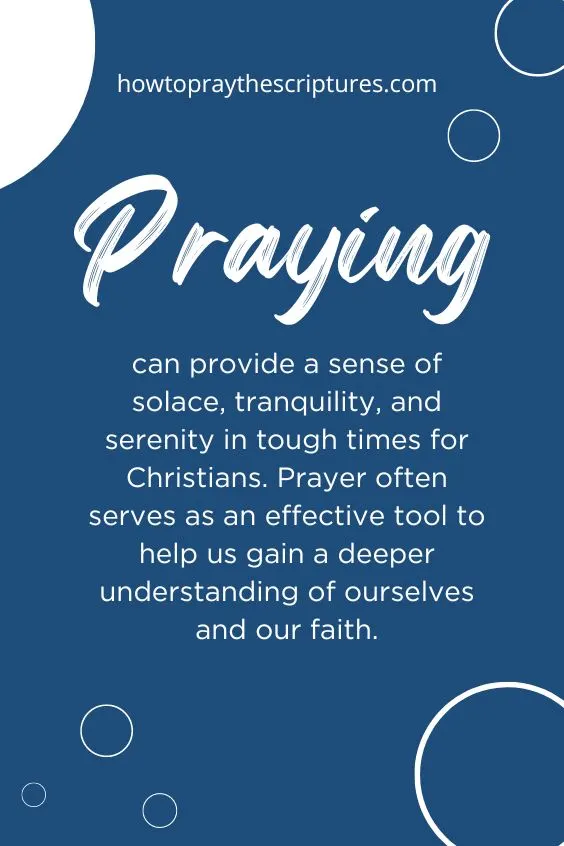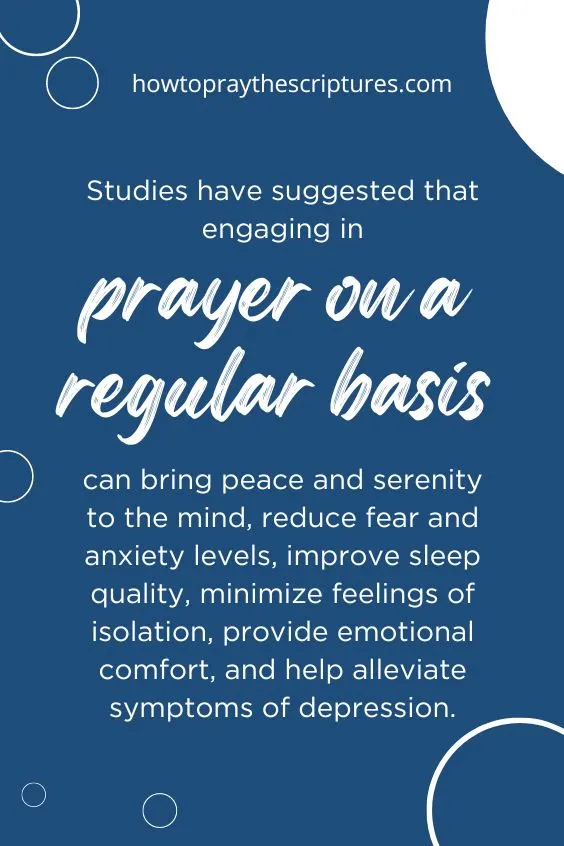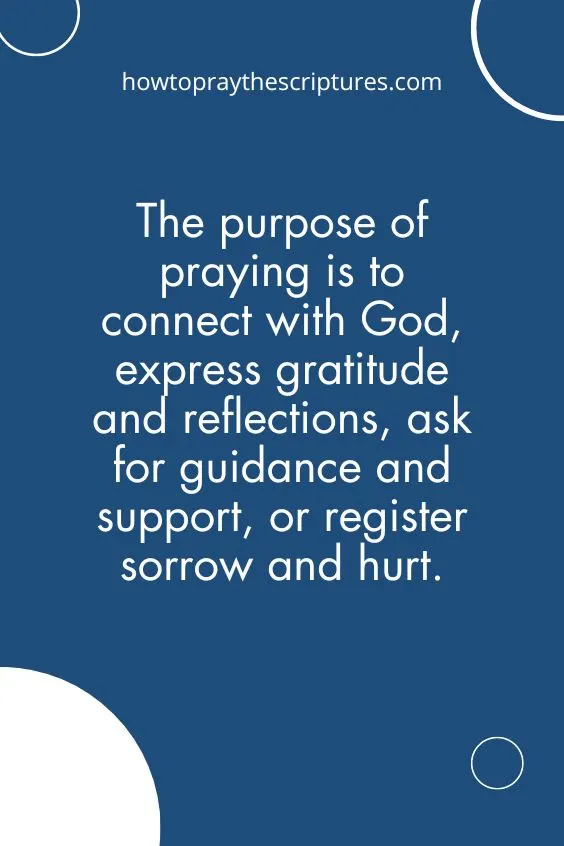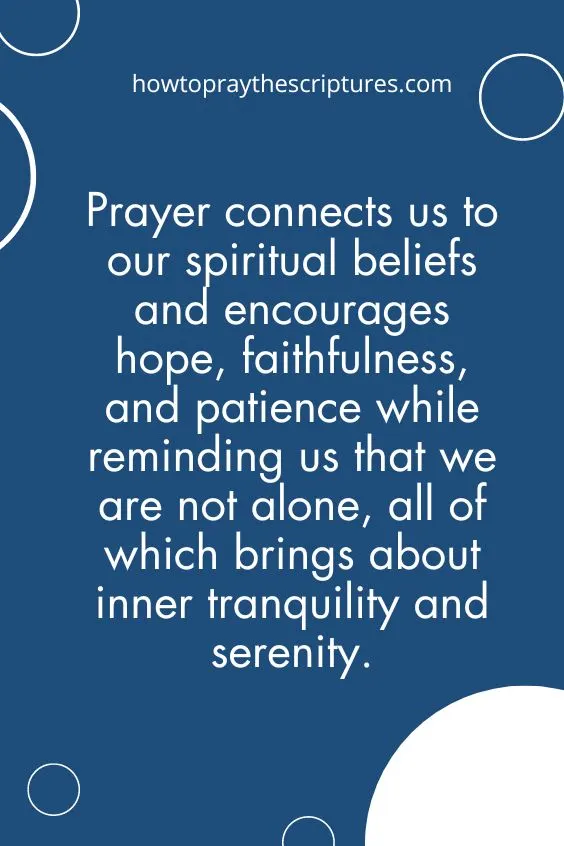If you’re feeling overwhelmed by racing thoughts or consumed with anxiety, you’re definitely not alone, as countless people experience similar feelings all too often.
Based on various research findings, this article will explain how prayer can help you manage negative emotions. In this article, we’ll look at the potential benefits of praying in regards to mental health issues, such as fear, depression, and intense worry.
Additionally, we will explore various ways that prayer can bring about emotional comfort and examine how it may decrease symptoms associated with anxiety disorders. Let’s dive in!
The Relationship Between Prayer and Anxiety
Prayer is known to have a calming and restorative effect, both for the mind and body. It offers potential mental health benefits, such as reduced feelings of isolation, fear, and depression, while also reducing symptoms associated with anxiety disorders.

Does Praying Calm You Down?
Prayer as a means of calming the mind and body
Praying is an important spiritual practice for many Christians. It’s a powerful way to connect with God, deepen our sense of trust and faith, and reduce feelings of isolation and fear.
Studies have found that prayer creates peace within the body by calming the nervous system and promoting relaxation. Moreover, it can also help individuals cope with depression, stress, anxiety, trauma, and other difficult life situations.
By reflecting on different Scriptures related to hope or comfort during times of stressful circumstances or emotional exhaustion, praying enables individuals to maintain their emotional health.
During this time of reflection, prayer can create an inner serenity that overcomes one’s initial worries and thoughts by providing a guiding force toward what needs fixing before taking action related to those worries or deep anxieties.
Possible psychological benefits of prayer
Praying can provide a sense of solace, tranquility, and serenity in tough times for Christians. Prayer often serves as an effective tool to help us gain a deeper understanding of ourselves and our faith.

Does Praying Calm You Down?
It can also be seen as a way to cope with times when we feel overwhelmed by life’s difficulties or fearful of the unknown. Research has shown that prayer is modestly but positively correlated with mental health outcomes, such as reducing symptoms of anxiety disorders, increasing optimism, developing better coping mechanisms, and improving psychological well-being.
Prayer encourages mindfulness—paying attention to the present moment without judgment—which promotes relaxation both mentally and physically. It reduces heart rate and decreases muscle tension while allowing one’s breathing rate to slow down.
In tense moments filled with fear or despair, prayer provides an opportunity for individuals to quiet their minds through focused contemplation on their relationship with God or a higher being. This connection will help you reconnect with your innate spiritual needs due to your faith that God will turn things around eventually.
Potential effects on brain chemistry and structure
Prayer has been shown to have incredible effects on the brain chemistry and structure of those who regularly engage in it. Studies conducted on the brains of individuals engaging in prayer or ongoing meditation practices suggest possible changes in the neural networks responsible for generating emotion, as well as increases in neurotransmitters that play an important role in mitigating anxiety or stress.
For instance, one study showed greater activation in parts of the brain associated with relaxation when participants were asked to focus their attention on a spiritual practice, such as prayer or meditation.
Other studies have found increased levels of serotonin, melatonin, and endorphin production during periods of intense prayer; all of these neurochemicals are related to a reduction in anxiety signaling within our brains.
In addition, higher clamping forces observed through MRI scans suggested physical relaxation accompanied by fewer feelings of fear or worry among those engaging in extended periods of prayers.
Research on Prayer and its Ability to Calm Anxiety
Studies have suggested that engaging in prayer on a regular basis can bring peace and serenity to the mind, reduce fear and anxiety levels, improve sleep quality, minimize feelings of isolation, provide emotional comfort, and help alleviate symptoms of depression.

Does Praying Calm You Down?
Findings on how prayer can reduce feelings of isolation, fear, and depression
Research has found that prayer can help reduce feelings of isolation, worry, and desolation. Studies have shown that participating in devotional prayer is associated with lower rates of depression, stress, and loneliness.
Furthermore, psychological effects like spiritual comfort and asking God for forgiveness during prayer are linked to enhanced mental well-being. Brain scans conducted on individuals who participate in regular prayer sessions suggest that they experience decreased symptoms of depression immediately following these sessions, which continues to hold true even after several days or weeks have passed.
Prayer provides a form of social connection between those looking for solace amid emotional distress; rather than being a solitary practice, it serves as an integrated coping mechanism where believers focus their prayers toward one deity who listens patiently from afar.
By sharing our fears with this unseen higher existence and expressing our gratitude, we allow ourselves space away from earthly concerns, thereby achieving peace.
Role of Prayer in Promoting Emotional Comfort and Reducing Symptoms of Anxiety Disorders
Prayer is an age-old practice that has been proven to provide a wide range of psychological benefits. Through connecting with innate spiritual needs and recognizing the benevolence of a higher being (in this case God), survivors are more likely to feel comforted during difficult times and are able to regain control over their anxiety symptoms.
A number of studies indicate that prayer decreases physical symptoms of anxiety disorders, such as rapid heart rate and sweating.
In comparison to other methods for relaxation, like meditation or mindfulness practices, praying may require less training but offers similar results in terms of stress reduction. Specifically, it has been associated with a lower heart rate, reduced muscle tension, and slower breathing rates in those who prayed in comparison to those who didn’t.
Comparison to other methods of relaxation, such as meditation
Prayer and meditation are both recognized as effective methods to calm the mind, reduce anxiety, and even influence our brain chemistry and structure. Let’s explore how these two practices compare in terms of their impact on relaxation.
| Prayer | Meditation | |
|---|---|---|
| Brain Chemistry and Structure | Prayer is thought to trigger changes in brain chemistry and structure, inducing a calm and relaxed state. | Meditation, particularly spiritual meditation, has been shown to have similar effects on brain chemistry and structure, contributing to a decrease in anxiety. |
| Nervous System Calmness | Prayer has a calming effect on the nervous system, reducing reactivity to traumatic or negative events. | Meditation has similar benefits in terms of calming the nervous system and reducing reactivity to traumatic or negative events. |
| Anxiety and Positivity | Prayer can reduce feelings of isolation, fear, and depression, promoting emotional comfort. | Spiritual meditation has been found to be more effective in reducing anxiety and promoting positivity as compared to secular forms of meditation. |
| Time Efficiency | Prayer, regardless of length, can offer emotional comfort and anxiety relief, with the potential for long-lasting effects. | Spending even a few minutes meditating can help restore calmness and inner peace, making it a fast and simple way to reduce stress. |
| Depression Alleviation | Prayer and spirituality can alleviate depression and provide support during challenging times. | Meditation can help manage depression and anxiety, as well as aid in pain management. |
| Scientific Evidence | Scientific evidence, such as the Mayo Clinic prayer study, suggests that prayer works and can have positive effects on mental health. | Scientific studies, including the Harvard prayer experiment, indicate meditation’s potential for delivering health benefits. |
Through this comparison, we can see that both prayer and meditation provide valuable mental health benefits. They offer relief from anxiety, promote positivity, and influence brain health in beneficial ways.
Conclusion
Research on the relationship between prayer and anxiety suggests positive effects of prayer in reducing feelings of fear, isolation, and depression. Prayer can also provide emotional comfort and serenity, which is especially beneficial for those with chronic stress or an anxiety disorder.
Comparison to other relaxation methods, such as meditation, show that both are effective in calming the mind while providing other unique benefits based on individual beliefs.
Prayer can produce a range of physiological changes in the body associated with reduced levels of stress, tension, and fear, along with increased calmness, which results from activating certain parts of the brain responsible for mediating the pleasure response or creating connections between different parts of the brain associated with cognition.
Despite these potential benefits, it is important to remember that praying alone may not be enough to reduce severe psychological problems; research suggests that it is more effective when accompanied by professional treatment, such as cognitive-behavioral therapy or medication.
FAQs
1. What is the purpose of praying?
The purpose of praying is to connect with God, express gratitude and reflections, ask for guidance and support, or register sorrow and hurt.

Does Praying Calm You Down?
2. Can praying help calm me down?
Yes, engaging in prayer can be a calming and soothing experience, as it releases endorphins in the brain that promote feelings of contentment. It can also help reduce anxiety, provide emotional relief, improve coping abilities during stressful times, and increase your overall sense of peace.
Prayer connects us to our spiritual beliefs and encourages hope, faithfulness, and patience while reminding us that we are not alone, all of which brings about inner tranquility and serenity.

Does Praying Calm You Down?
3. How do I pray effectively?
To effectively connect through prayer, find a comfortable spot where you will be undisturbed; take deep breaths before beginning your sessions; keep an open mind; talk openly and honestly from the heart by speaking out loud; focus on expressing gratitude towards God; freely share personal issues while looking for constructive ways to grow, rather than complaining about them.
4 What type of prayers should I say when feeling agitated or overwhelmed?
When feeling overwhelmed by anger or agitation due to stressors around us, from work overload to challenges at home and relationship troubles, positive and uplifting prayers help one become mentally strong, even under trying circumstances.